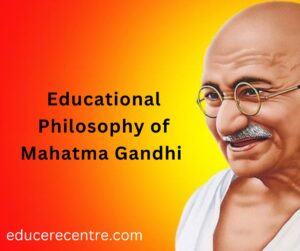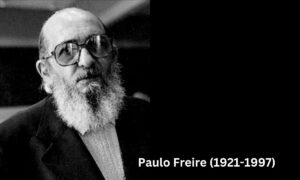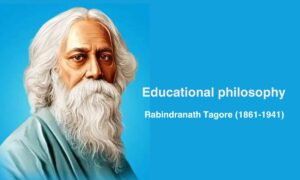Life Sketch of Sri Aurobindo
Sri Aurobindo was born on 15 August 1872 in Kolkata. His initial schooling was in a convent school in Darjeeling and at the age of 7 years, He was sent to England for further Education. For his Higher Education, He studied in London and Cambridge universities.
He returned from England in 1893, he became a teacher at Baroda College. After a few years, he resigned and joined as a professor at the National School at Kolkata. He edited the papers Vande Mataram and Jugantar for some time and continued to write against the British Government.
He moved to Pondicherry in 1910, and there he set up a divine centre in order to give a practical form to his thoughts, which became famous by the name of Aurobindo Ashram
Sri Aurobindo is considered a Renaissance figure of the twentieth century. He opined that the objectives of education framed by the British Empire in India were the real source of evil. He stressed that this system has confined the young minds of students as just “storing faculty of memory and the storage of facts”. He said that the training of the three faculties the power of reasoning, analogy and expression were neglected completely. According to him this type of education did not encourage the students to make the best use of what they knew and led to failure.
Aurobindo dedicated most of his life to inspiring the study of experimentation in the field of education. He had a sharp eye for observation of social phenomena and developed an in-depth understanding of Eastern and Western educational thought. He initiated an education system that laid equal importance to all faculties of human development and was vale based on the same scientific approach
Fundamental of Sri Aurobindo
Integral Education
His remarkable contribution to the field of education is the Concept of Integral Education as envisioned Sri Aurobindo regards the child as a developing soul and nurtures him to bring out the best in his nature. It helps the child to develop a strong personality and awakens his latent possibilities so that he can acquire
- A strong, supple and healthy body
- A sensitive, emotionally stable and energetic personality
- Lively intelligence and strong willpower
- The subtler spiritual qualities that unify the child’s soul
The emphasis in Integral education is not just on the acquisition of information and skills but on self-development, triggered from within and nourished by Teachers and parents. Every experience becomes a learning for a child.
Integral education helps the child to harmonize with their true self, humanity, surroundings, society and the country. In simple words, it helps the child become a complete being. According to Aurobindo, this perfection happens through the development of all aspects of human personality i.e., cognitive, conative and affective
Emphasis on Yoga
He regarded Yoga as an indispensable part of living a healthy life. He said yoga is the culmination of education, ‘Both education and yoga seek for the ideal of individual and social development. He said that when educational practices exhaust their means for purpose, yoga takes up to load man towards perfection”.
He recommended karma yoga and dhyana yoga. For following these two paths, an individual needs to follow the eight step of yoga, Ashtanga yoga (Yama, niyama, asana, pranayama, pratyahara, dharana, dhyana and samadhi). According to Aurobindo, this should be the final aim of education
The four layers of the Mind
According to Aurobindo, “the individual is a centre of the whole universal consciousness”. Man is a “spirit using the mind, life and body for individual and communal experience and self-manifestation in the universe”. The instrument of education is the mind which consists of four layers namely Chitta, manas, Buddhi and Supra normal faculties/ Intuition.
- Chitta is the storehouse of past memories and impressions; It includes passive memory and active memory
- Manas is that layer which receives images gathered by sense perceptions from the five sense organs.
- Buddhi is the intellect, it systematizes sensation and gives power to discrimination. It has two types of function: first includes observation, imagination and judgement
- The fourth layer of mind the Supra Mind Faculties or Intuition is the extra sense perception that covers clairvoyance and psychokinesis. It can be referred to as a sixth sense.
The concept of microcosm and macrocosm
According to Sri Aurobindo, “the society is only an enlargement of the individual”. He explained that man’s personality has a three-dimensional perspective- individual, universal, and transcendental.
He stated that the universe is the brahmanda (macrocosm) and the man is a small part of the brahmanda (microcosm)The concept of Known to Unknown: In his opinion, Education does not imply doing something new, but its purpose is to manifest and develop the potentialities of the human being that are latent in him.
The purpose of education according to him is “to know the unknown”. For him, the primary function of education is to develop in man the wisdom to unravel and know his true nature and hidden potentialities. He opined that through his realization of the practice of yoga” man will become a super mind.
The supermind will have a super mental consciousness. Consciousness of sat-chit-Anand: Truth, Self, Bliss: Truth, Beauty, Goodness
Educational Philosophy of Sri Aurobindo
Aims of Education
- Physical Development. And the attainment of sat+chit+anand
- Vocational Development
- All-round development of the personality
- Social Development
- Education for Nationalism: He stated,” The education was are in search of is an education appropriate to the Indian soul and need and nature and culture, not merely an education which has faith in the past also, but towards the developing soul of India”
- Panic Development: Pana’s is the life force/ the energy due to which transformation within and the universe occurs.
- Mental Development
- Development of inner Self: Sir Aurobindo mentioned four layers of mind, manas, buddhi and sat/intuition/inner self, the aim of education according to him education is the development of the inner self.
Curriculum
- Principles of curriculum organization
- Include subjects which meet the needs and interest of children and are actively oriented
- Can assist in making practical life successful. Develop both spiritual and physical domain of child
- Primary Level; Mother tongue, English, General, science, social studies, arts, foreign language such as French etc
- Secondary Level: Mother tongue, English, mathematics, social studies, physics, chemistry, biology, botany, zoology, foreign language, geology and arts.
- University level: History of civilization, international politics and science, Indian and western philosophy, Psychology, sociology, history, English literature, French literature, physics, chemistry and other scientific subjects
- Vocational Education: It may include, Indian and European craftwork, handcraft, painting, dancing drawing, photography, architecture music and other liberal arts etc.
Methods of Teaching
- Learning by doing method
- Self-effort, self-experience and observation
- Oral method which implies lecture method
- Discussion Method
- Experimental Method
- Through Project and Activity
- Self-Study method is essential for the most sublime knowledge
Roles of Teacher and Student
- Guru was considered as the living ideal of righteousness, good conduct and perfection for his disciples
- He is not just a mentor to his students but also their nurturer and guide
- Teacher must encourage the students to read good books and Literature
- They must know the interest and aptitude of their students
- Aurobindo believed that the child is the center of education
- In support of the importance of child in the teaching learning process, he said “The idea of hammering the child into the shape desired by the parents or teacher is a barbarous and ignorant act. There can no great error from the parent to arrange beforehand that his son shall develop particular qualities and ideas. To force the nature to abandon his own dharma is to do it permanent harm, mutilate its growth and deface to perfection
Role of School and Discipline
- Education and discipline are interrelated
- Discipline through yoga practice and moral education
- Emancipationist and impressionistic discipline on a spiritual basis
References
- https://egyankosh.ac.in/bitstream/123456789/8277/1/Unit-12.pdf
- https://www.studocu.com/in/document/dharmashastra-national-law-university-jabalpur/administrative-law/144-political-science/55713797


